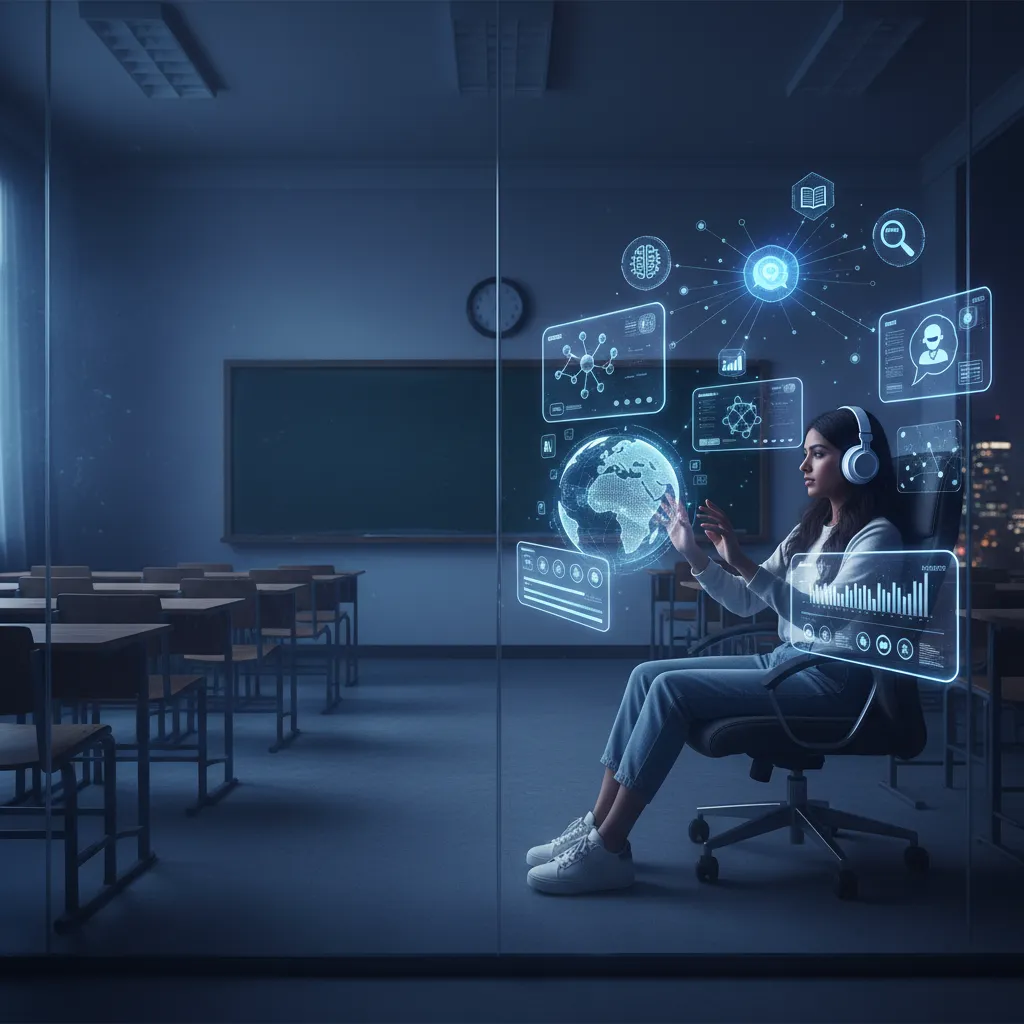AI-Personalization in Online Colleges: Revolutionizing Digital Learning
The rise of AI-personalization in online colleges has transformed the way students learn, interact, and achieve success in the digital classroom. With the expansion of e-learning and remote education, artificial intelligence (AI) has become one of the most powerful tools in higher education. It enables colleges to create customized learning paths that adapt to each student’s needs, preferences, and performance in real time.
In today’s competitive education landscape, institutions that adopt AI-personalization are setting new standards for efficiency and engagement. This technology-driven approach doesn’t just make online learning more effective — it redefines the entire concept of education by focusing on the learner rather than the lesson plan.

The Evolution of Online Colleges and Digital Learning
From Traditional Classrooms to Virtual Campuses
Education has come a long way from chalkboards and lecture halls. Over the past two decades, online colleges have transitioned from simple distance-learning programs to complex, interactive ecosystems that deliver high-quality education entirely online.
The global pandemic accelerated this shift. As universities worldwide moved online, they began exploring smarter ways to maintain engagement and support diverse learners. This transition laid the foundation for AI-personalization to emerge as a natural next step.
The Role of Technology in Modern Education
The first generation of online learning used static course materials and one-size-fits-all instruction. However, with the rise of learning management systems (LMS) and real-time analytics, educators started gathering valuable data about student behavior. That data — including performance metrics, attendance, and engagement — now fuels AI algorithms that personalize learning experiences at scale.
What Is AI-Personalization in Online Colleges?
Defining AI-Personalization
AI-personalization refers to the use of artificial intelligence technologies to customize learning for each individual. Instead of offering identical content to all students, AI adapts lessons, tests, and recommendations based on a learner’s strengths, weaknesses, and progress.
How AI Learns from Student Behavior
AI collects data points such as study duration, quiz accuracy, discussion participation, and assignment submissions. Using machine learning models, the system identifies patterns that predict how a student learns best. For example, if a learner struggles with visual materials but performs better in audio lessons, the AI can automatically provide more podcasts or voice-based learning tools.
This creates a truly adaptive learning environment that continuously evolves alongside the student’s development.
The Core Technologies Behind AI-Personalization
Machine Learning and Predictive Analytics
At the core of AI-personalization lies machine learning — the ability of computers to analyze data and improve over time without direct programming. Machine learning algorithms in education detect learning patterns, predict performance outcomes, and offer proactive recommendations to both students and teachers.
Natural Language Processing (NLP)
Natural Language Processing (NLP) allows AI systems to understand and communicate using human language. Chatbots powered by NLP can answer student questions, clarify complex topics, and even offer emotional support. This makes online education more conversational, interactive, and accessible.
Data Analytics and Behavior Tracking
Through data analytics, online colleges can monitor engagement levels and identify at-risk students before they fall behind. Predictive models help institutions make informed decisions about course design, ensuring a continuous cycle of improvement.
Benefits of AI-Personalization for Students
Tailored Learning Experiences
The most immediate advantage of AI-personalization is that it allows students to learn at their own pace. No two learners are the same, and AI recognizes this by adapting content difficulty, style, and format according to individual progress.
Higher Engagement and Motivation
When students receive lessons that reflect their interests and abilities, they naturally feel more engaged. Features like interactive quizzes, gamified dashboards, and adaptive learning paths create a sense of achievement that fuels motivation.
Real-Time Feedback and Support
AI tools offer instant feedback, helping students understand their mistakes right away instead of waiting for instructor grading. This real-time support enhances retention and fosters a sense of control over one’s own learning journey.
Benefits of AI-Personalization for Educators and Institutions
Smarter Curriculum Development
For educators, AI-personalization provides deep insights into how students interact with course content. Teachers can use these insights to refine materials, adjust teaching strategies, and address common pain points across cohorts.
Efficient Resource Management
Online colleges benefit by allocating teaching resources more effectively. AI can identify which courses need more human support and which areas can be automated, optimizing operational efficiency.
Improved Retention and Completion Rates
By predicting student performance and identifying early signs of disengagement, AI helps colleges create targeted intervention strategies. This leads to higher retention rates, better academic outcomes, and stronger institutional reputation.
Real-World Examples of AI-Personalization in Online Colleges
Coursera’s Adaptive Learning Algorithms
Platforms like Coursera use AI to recommend personalized courses and modules. Based on previous learning behavior and skill assessments, Coursera’s system suggests the most relevant content for each learner’s career path.
Arizona State University’s eAdvisor System
Arizona State University (ASU) employs an AI-driven advising platform called eAdvisor. It uses predictive analytics to recommend suitable majors and track academic progress, helping students stay on the right path toward graduation.
Duolingo’s Personalized Language Lessons
While Duolingo isn’t an online college, it’s an excellent example of AI-personalization in action. The platform adapts language lessons in real time, adjusting difficulty and review cycles based on user performance. Online universities are adopting similar methods across other subjects.
The Role of AI Tutors and Chatbots
Virtual Assistants and 24/7 Support
AI tutors and chatbots are redefining student support services. They provide instant, 24/7 assistance for everything from course questions to assignment deadlines. This helps create a seamless learning experience, particularly for international students across different time zones.
Reducing Teacher Workload
AI systems can automate repetitive administrative tasks like grading quizzes, sending reminders, or managing attendance. This allows educators to focus on mentorship and high-value activities that require human empathy and creativity.
Personalized Feedback Mechanisms
AI tutors deliver feedback that’s both immediate and data-driven. For instance, after completing an assignment, a student might receive an automated yet detailed analysis explaining strengths, weaknesses, and areas for improvement — something traditional grading cannot offer at scale.
Ethical Considerations and Data Privacy in AI-Personalized Learning
Data Security and Ownership
One of the major concerns with AI-personalization is data privacy. Online colleges collect vast amounts of sensitive information — from test results to behavioral analytics. It’s crucial that institutions ensure data protection, encryption, and transparency regarding how data is stored and used.
Avoiding Algorithmic Bias
AI systems can unintentionally inherit biases from the data they’re trained on. If unchecked, this could disadvantage certain groups of students. Colleges must implement ethical AI practices and regularly audit their systems for fairness.
Transparency and Consent
Students should always be aware of what data is being collected and why. Institutions should offer clear explanations and consent options to promote trust in AI-powered learning environments.
Challenges and Limitations of AI-Personalization
Cost of Implementation
Building and maintaining AI infrastructure can be expensive. Smaller online colleges may struggle with the financial and technical requirements needed to deploy advanced AI solutions.
Complexity of Integration
Integrating AI with legacy systems is another challenge. Many universities rely on outdated learning platforms that aren’t designed for real-time analytics or machine learning integration.
Human Resistance and Adaptation
Educators and administrators may resist adopting AI due to fear of job displacement or lack of understanding. Overcoming this requires training programs and clear communication that AI is a tool to enhance, not replace, human teaching.
The Future of AI-Personalization in Online Colleges
Integration with Immersive Technologies
The future of online education lies in combining AI-personalization with technologies like virtual reality (VR) and augmented reality (AR). These immersive tools will allow learners to experience hands-on simulations personalized by AI for their learning style.
Blockchain and Credential Verification
AI may soon work alongside blockchain systems to securely track student progress and verify digital credentials. This will create transparent, tamper-proof academic records recognized across institutions.
Lifelong Learning and Continuous Upskilling
AI-powered platforms will extend beyond degree programs, supporting lifelong learning for professionals seeking to reskill and adapt to evolving job markets. The same personalization principles that work in online colleges will power workforce education at a global scale.
Conclusion
AI-personalization in online colleges represents a turning point in the history of education. It empowers institutions to deliver learning experiences that are not just digital — but deeply human, responsive, and individualized. By analyzing data, predicting performance, and tailoring content, AI bridges the gap between traditional teaching and the unique needs of every learner.
As technology continues to evolve, the future of online education will belong to those institutions that balance innovation with ethics. The successful colleges of tomorrow will combine the intelligence of machines with the empathy of educators — creating a hybrid learning model where AI-personalization transforms not just how we learn, but how we think about learning itself.











